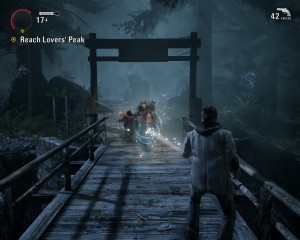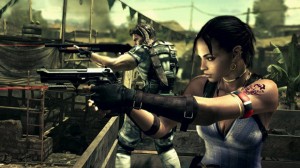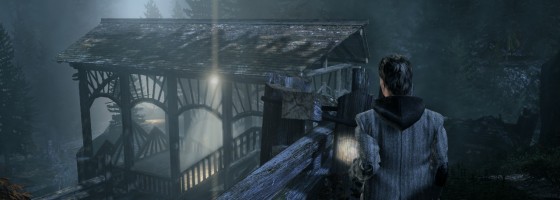In horror design these days, the big push would have to be the inclusion of Co-op. Resident 5 and 6, Dead Space 3 and the latest Silent Hill game that was a top down dungeon crawler are leading the charge. I bet designers see themselves as being clever, except there is one little tiny problem with how co-op is currently used: It DOESN’T CREATE HORROR.
The Alpha
When we look at both horror games and movies, there are two types of heroes: Alpha characters and survivors. Alpha characters are those that actively fight the monsters, characters like Ash from Evil Dead, Mac-ready from The Thing or Ripley from Alien. Survivors are people that are just trying to get away, or have no means to defend themselves until they find the key to stopping the monster. Some movies that go this route are: Hell Raiser, Nightmare on Elm Street, and Friday the 13th.
Both types of movies provide a different type of horror. Those with Alpha characters are about one person or group fighting an unimaginable force where failure would mean the end of everything. While survivors are about seeing who gets knocked off first and figuring out who will be left standing.
When it comes to video games, because of how games are built around action, designers tend to create alpha characters. This includes everyone from Leon Kennedy in Resident Evil, to Isaac in Dead Space, and even the Doom marine. In these cases you’re not supposed to be afraid because the character is weak, but because they are force to fight an evil force alone.
Even characters that aren’t considered strong, like Alan Wake or Isaac still fall into the Alpha category. As they alone must fight to save everyone from the evil using whatever tools they have.

Alan Wake’s status as an alpha hero is an exception from other games, as it is a major plot point instead of as part of the setting.
However, my favorite horror games are about survivors: where they’re not actively fighting the evil, but just trying to find a way to survive. Games like Fatal Frame 3, Haunting Ground, or Amnesia.
Where the player isn’t trying to save the world, but just trying to escape the situation. Even if the player is given any weapons, they won’t make the situation calm or downplay the horror.
Instead in these games, they increase the tension as the player knows that at some point they will have to fight and hopefully survive. It’s these types of games where I think co-op horror would work best, but I’m getting ahead of myself.
One Gun or Two?
The problem with the inclusion of co-op elements in alpha horror design is that they remove the main source of fear in these games: isolation. The player is just one person, stuck in a horrible situation; it’s ok to give the player weapons and tools, as they are alone.
But when you add in a second player, that isolation is gone. Even if you raise the number of enemies attacking, the dread that you are just one person against the force is no longer present. Reducing the horror element and making the title play more like an action game.
For horror titles that deal with clunky controls like Dead Space or Resident Evil, the best strategy becomes putting your back to a wall and blasting anything that comes close. One idea that designers use is to limit ammo and recovery items between the two players such as in Resident Evil 5. But artificially raising the tension that way still doesn’t produce horror.
What designers need to do in my opinion to have horror in a co-op setting is to change the type of horror that they are striving for.
Situational Survivor:
Being the lone hero (or heroes) doesn’t produce horror due to the Alpha design, but when the player isn’t that unstoppable force can do a lot to raise the tension of the game.
Very few horror games, much less co-op titles put the player in a survivor role. But when it’s done right, can make a situation scary no matter if it’s just you, or a group.

Resident Evil 5 started the co-op horror trend and was noticeably less scary compared to previous games in the series.
One of the biggest successes this year of this style of design would be the DayZ mod for Arma 2. DayZ was a total mod conversion for Arma 2, which is a hyper realistic military shooter.
The mod takes the setting and puts a server full of players into the zombie apocalypse, while keeping the realism of the game.
What happens is that all the pressure of having limited supplies, accurate weapons and realistic damage, is applied to a world where the undead have taken over. And just like many of the zombie movies, sometimes the worse enemy is man, as the game has completely open PvP.
This is where I feel co-op can work in a horror setting: Where a group of players must watch each other’s back and conserves resources while dealing with an overwhelming threat. Suddenly you can’t just run into a group of undead shooting randomly like in Left 4 Dead. As one good hit could injure you or cause you to bleed out, or conserving ammo until you have no choice but to fire your weapons.
“The problem with the inclusion of co-op elements in alpha horror design is that they remove the main source of fear in these games: isolation.”
Something like a middle ground between Left 4 Dead and Day Z, where a group of players must escape a randomly generated area while being threaten from every corner.
The important part of the design is that the group should be more powerful then each individual member, making the times where people have to split up all the more terrifying. When this is combined with limited resources will force the players to make hard decisions about how equipment should be divvied up
Because we’re dealing with survivors and not alpha heroes, the situation of dealing with a stronger force, or accomplish a difficult goal would be even tenser.
Co-op design can work in a horror setting, but not in the current template that designers use. Making the title less scary and more of an action game just makes it more generic. Just like with anything else, you can’t just add a mode or design and force it into another game and expect it to work. Coming up with a horror title that makes use of co-op design, is going to require someone creative and a different view compared to what designers are using now.



Pingback: Perceptive Podcast #1 : Kickstarters,Horror and the Wii U | Game Wisdom()
Pingback: The Three Senses of Horror : Touch | Game Wisdom()